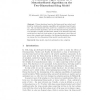Free Online Productivity Tools
i2Speak
i2Symbol
i2OCR
iTex2Img
iWeb2Print
iWeb2Shot
i2Type
iPdf2Split
iPdf2Merge
i2Bopomofo
i2Arabic
i2Style
i2Image
i2PDF
iLatex2Rtf
Sci2ools
100
click to vote
GECCO
2004
Springer
2004
Springer
A Polynomial Upper Bound for a Mutation-Based Algorithm on the Two-Dimensional Ising Model
Abstract. Fitness functions based on the Ising model are suited excellently for studying the adaption capabilities of randomised search heuristics. The one-dimensional Ising model was considered a hard problem for mutation-based algorithms, and the two-dimensional Ising model was even thought to amplify the difficulties. While in one dimension the Ising model does not have any local optima, in two dimensions it does. Here we prove that a simple search heuristics, the Metropolis algorithm, optimises on average the two-dimensional Ising model in polynomial time.
| Added | 01 Jul 2010 |
| Updated | 01 Jul 2010 |
| Type | Conference |
| Year | 2004 |
| Where | GECCO |
| Authors | Simon Fischer |
Comments (0)

